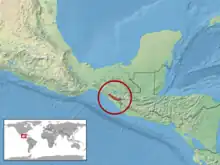Abronia smithi
Abronia smithi is a species of lizard in the family Anguidae. Known by the common name Smith's arboreal alligator lizard, the species is endemic to the state of Chiapas in Mexico.[1][3]
| Abronia smithi | |
|---|---|
 | |
| Scientific classification | |
| Domain: | Eukaryota |
| Kingdom: | Animalia |
| Phylum: | Chordata |
| Class: | Reptilia |
| Order: | Squamata |
| Family: | Anguidae |
| Genus: | Abronia |
| Species: | A. smithi |
| Binomial name | |
| Abronia smithi | |
 | |
Taxonomy and etymology
A. smithi was described in 1993 by Jonathan A. Campbell and Darrel Frost, and named after the American herpetologist Hobart Muir Smith.[4][5]
Habitat and geographic range
A. smithi is an arboreal species which lives in the canopies of large trees in the cloud forests of the Sierra Madre de Chiapas.[1] Its elevational range is 1,800–2,800 m (5,900–9,200 ft) above sea level.[1][3]
Reproduction
A. smithi is viviparous.[3]
Conservation status
A. smithi is only known to exist in a few localities in Chiapas. It is uncommon and may be threatened by deforestation, but it occurs in protected habitat, including the El Triunfo Biosphere Reserve.[1]
References
- Campbell JA, Muñoz-Alonso A (2007). Abronia smithi. The IUCN Red List of Threatened Species. Version 2014.3. Downloaded on 26 March 2015.
- "Appendices | CITES". cites.org. Retrieved 2022-01-14.
- Abronia smithi at the Reptarium.cz Reptile Database. Accessed 10 October 2017.
- Campbell, Jonathan A.; Frost, Darrel R. (1993). "Anguid lizards of the genus Abronia: revisionary notes, descriptions of four new species, a phylogenetic analysis, and key". Bulletin of the American Museum of Natural History. 216: 1–121. hdl:2246/823. Archived from the original on 2015-04-02. Retrieved 2015-03-26.
- Beolens, Bo; Watkins, Michael & Grayson, Michael (6 September 2011). The Eponym Dictionary of Reptiles. JHU Press. xiii + 296 pp. ISBN 978-1-4214-0227-7. (Abronia smithi, p. 247).
Further reading
- Johnson JD, Mata-Silva V, García Padilla E, Wilson LD (2015). "The Herpetofauna of Chiapas, Mexico: composition, distribution, and conservation". Mesoamerican Herpetology 2 (3): 272–329.
- Köhler G (2008). Reptiles of Central America, Second Edition. Offenbach am Main, Germany: Herpeton Verlag. 400 pp. ISBN 978-3936180282.
